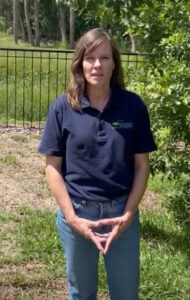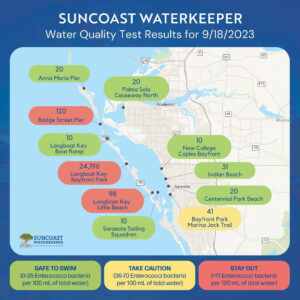The action comes in response to the demise of wetland buffers in the county.
By Dean Gallo
Original Air Date: Sept. 22, 2023
Host: Suncoast Waterkeeper is the small non-profit that could. Not only is the environmental organization systematically keeping tabs on water quality in this area, but it is now flooding local elected officials with evidence about how a recent vote is not good for Manatee County. WSLR citizen reporter Dean Gallo has more on that.
Dean Gallo: The Manatee County Commission has recently ceded local control to the state on the amount of wetland buffers, despite organized pushback by residents and scientists at planning board and county commission hearings.
The State of Florida does not comply with its own comprehensive plan, says Dr. Abbey Tyrna, which means that counties must act on their own to protect clean drinking water in the region. So the elimination of watershed overlay districts has serious consequences for the entire county. Dr. Tyrna, executive director of Suncoast Waterkeeper, explains:

Dr. Abbey Tyrna
Abbey Tyrna: One of the most critical parts of this is, there are areas with boundaries drawn around them, to signify that they’re important areas for our drinking water. They’re called watershed overlay districts. These districts are areas in which the water drains directly intro a drinking water source. There’s a tributary of Lake Manatee that is undeveloped right now. And that tributary right now is afforded a greater than 50 foot buffer, to protect our drinking water source well. After these changes are adopted, a tributary will no longer be afforded any protection. State law does not require and buffer zones around streams and tributaries. Therefore, you can develop right up to it. That means, all your lawn chemicals, all your pet waste, your landscaping, and your construction debris during development that goes into that tributary can wind up directly in Lake Manatee. We already have recurring algae blooms in Lake Manatee. That increased the expense, treating that water to drinking water standards. … So we’re fighting for these protections. We’re fighting for our drinking water. But we’re also fighting for our base, because the wetland areas that have been undeveloped in the eastern part of Manatee County are extremely important for cleaning the water before it moves downstream into the bay. So thirdly, there’s also the mangroves on the edge of the bay that are afforded additional protection, as well as through buffers. So bigger buffers are currently within the Comprehensive Plan goals. We’re meeting water quality needs and preserving habitat, and those will go away as well. So that puts at risk the mangroves. And these mangroves are tightly connected with all sorts of fish.
D.G.: State guidelines may allow wetland buffer areas to be dramatically reduced or in some cases completely eliminated from the Manatee County standards that were just abolished. At the Aug. 17 Manatee County Commission meeting that ended local protections, dozens spoke against it. Commissioners asked critics to “show me the science”, and Dr. Tyrna delivered. She not only presented the state of science about the benefits of buffers for water quality and animal and human health, but she entered a long bibliography into the record. Even so, the commissioners dismissed Tyrna.
George Kruse was the sole Manatee County commissioner who voted “no”. His comments were telling.
George Kruse: When is the other side going to come up and speak? When is the other side going to line up and start talking about how great cutting wetland buffers is? Nobody, nobody here. And right now I’m looking out in this room. I can see right now three developer engineers. I can see a land-use attorney. None of them came up. They’re in the room during public comment. Do you know why they didn’t come up? Because there’s no way they’re going to go on the record supporting this, because it is a terrible idea. And there’s no way they’re going to put their name and their face behind supporting gutting our environmental wetland protection.
D.G.: Now, Suncoast Waterkeeper is organizing a meeting with three scientists next Tuesday in Bradenton. They encourage activists to attend, and take note of the scientists’ arguments regarding the consequences of radically reducing wetland. Then, listeners should sign up for public comment at the Oct. 5 Manatee County Commission land-use meeting, and enter these arguments into the record.
Abbey Tyrna: At the Oct. 5 meeting, the Commission will adopt changes to the comprehensive plan that roll back regulations for buffer zones and also wetland protection.
D.G.: What is Suncoast Waterkeeper trying to achieve with this action?
For one, the state agencies have a 30-day comment period on the commission’s decision. But ultimately, it’s about being on the record, and holding the six county commissioners who approved the changes accountable during the next elections.
It’s not like Waterkeeper wasn’t already busy enough. The group collects weekly samples of river, bay and Gulf water from 11 locations, using the same standard operating procedures and lab as local government agencies. The lab tests for enterococci bacteria, and Waterkeeper posts its results on Suncoast’s SWIM Guide, and on social media.
Enterococci bacteria inhabit the intestinal tract of humans and animals. Their presence can indicate fecal pollution, which can come from stormwater runoff, pets and wildlife, and human sewage. High concentrations in recreational waters is no good news for swimmers, kayakers and the like. Enterococci can enter the skin through a cut or sore, and could cause illness or infections.
While a state program, Florida’s Healthy Beaches, tests bacteria levels weekly at Gulf Coast beaches, many popular shoreside places – in particular the local bays – are not regularly monitored.
For example, at the newly developed 53-acre Bayfront Park in Sarasota that opened in October 2022, waters only met quality standards 60% of the time in 2023. This, despite the efforts of the non-profit in charge to reduce the environmental impact of the park to the surrounding area.
As part of their mission to inform and protect, Waterkeeper emails the results to local and state government agencies weekly. However, no actions to warn, trace or plan have been taken to address the problems they have found.
Information about the water monitoring system and the upcoming action is available at suncoastwaterkeeper.org.
This has been Dean Gallo, reporting for WSLR News.
WSLR News aims to keep the local community informed with our 1/2 hour local news show, quarterly newspaper and social media feeds. The local news broadcast airs on Wednesdays and Fridays at 6pm.